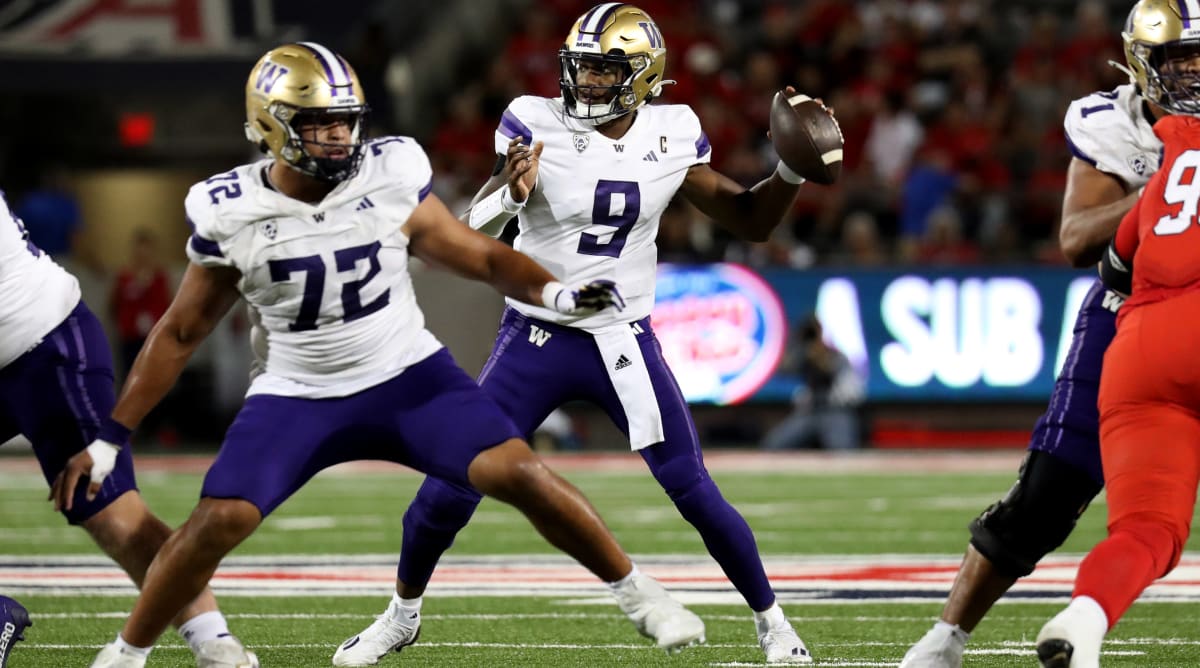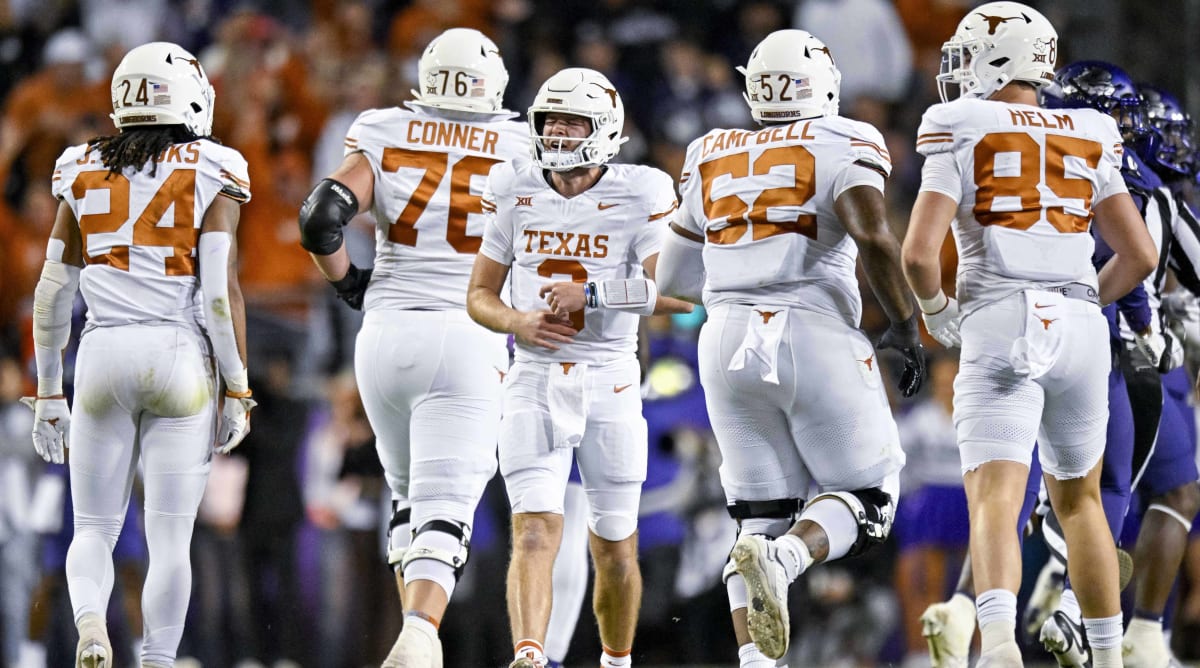It’s assuredly going to be a party in New Orleans outside the Superdome, but inside? Washington and Texas promise to deliver plenty of festivities as well in the Sugar Bowl. There are points aplenty all over this game, but how will it play out? We asked coaches who have game-planned for both what they think about how each unit matches up.
Washington offense vs. Texas defense
When breaking down UW’s outstanding receiving corps, Ja’Lynn Polk is not regarded as a player with blazing speed, but his hands jump out at those who have evaluated him. Rome Odunze is the best of the trio, specifically at adjusting to the ball when it’s in the air, and his connection with Michael Penix Jr. on back-shoulder throws down the field is nearly impossible to defend. But the missing piece for too much of this season has been Jalen McMillan, “the guy who keeps you up at night,” according to an opposing defensive backs coach. He’s expected to be nearly fully recovered from a knee injury and certainly looked plenty explosive in the Pac-12 championship game when he caught nine passes for 131 yards.
The strength of Washington’s passing game is in its numbers. It’s rare for a college team to have two bona fide defensive backs, let alone three. The health of Texas corner Ryan Watts will be key, as Texas’s secondary will get all it can handle from the Huskies due to the unorthodox deep shots that they take with great players.

Zachary BonDurant/USA TODAY Sports
Penix isn’t expected to have a Heisman hangover in this one. Opposing coaches point to how special he has been this season at the controls of an offense that has been tremendous. As the triggerman, Penix has an unconventional release that has been compared to Philip Rivers’s, and, in the words of one defensive coach who has faced Washington, the ball “just flies off his hand.”
Penix is seasoned in his sixth year, and his experience is pointed to as a reason why he’s regarded as good presnap in getting the Huskies into the right play no matter the look a defense gives, with one exception: Arizona State, which held Washington to nine offensive points and no touchdowns largely by lining six players across the line of scrimmage at the snap and alternating between bringing the house and dropping into coverage to confuse Penix and his protection. McMillan did not play, but ASU’s DBs held up, forcing multiple turnovers.
If Texas opts for the six-across look, it would be a departure from their normal 4-2-5 shell, and it can’t be understated how good Texas’s defensive linemen are. One Big 12 head coach says the unit was the best he’d coached against by far in run defense. A Big 12 position coach says it was the best front he’d coached against in his coaching career against the run. The combination of Byron Murphy and T’Vondre Sweat anchors the unit. One takeaway from watching multiple Texas games on film from one Big 12 coach was that over the course of the season, the defensive line has stayed consistent but the linebackers and DBs have gotten better.
“They just play so freely at linebacker because of how good they are on that front four,” he says. “They’re able to kind of go out there and play like free safeties. At times, they just fit where they want to [in run defense]. I think they’ve gotten better with their fits and things like that, but we did feel like they were they were they were a little bit aggressive.”
Multiple coaches didn’t regard Texas’s pass rush as unbelievable, and they don’t have an elite, pin-the-ears-back edge rusher. Sweat can push the pocket back from the middle, but that doesn’t always equate to sacks. If you can stand in and deliver, you can have success. It will be up to Penix to do so, but his unconventional release does allow the ball to get off quickly under pressure, however his footwork does tend to falter in the face of a heavy rush. That isn’t rare, but it’s noteworthy if Texas actually can start to get to him.
No offense is one-dimensional, but there’s a question about whether Washington is good enough to actually attempt to be. The Huskies are particularly good at what Texas is particularly good at stopping: running the ball up the middle. While Washington is better running the ball with Dillon Johnson (who one coordinator called a “big-time weapon” this year), will it stick with the run game especially if it’s not expected to gain chunks, or will the team replace the run game with bubble screens and quick-hitting passes on the perimeter that can gain them three or four yards at a time? There’s some disagreement between coaches Sports Illustrated spoke with about how Washington will handle that part of the game, but the offensive line did just win the Joe Moore Award and will be eager to prove it deserved that hardware.
Texas offense vs. Washington defense
For Texas on offense, the first question to answer is whether it can run the ball well without Jonathon Brooks. While Bralen Trice and Zion Tupuola-Fetui are good (especially in pass rush) on the edge, multiple opposing coaches think Washignton is vulnerable up the middle.
Texas has an opportunity to try to play something that resembles ball control if it chooses to do so, but it’s likely that this game will break out into a track meet anyway. In Xavier Worthy and Adonai “AD” Mitchell, Texas has its two dominant wideouts, but do not sleep on tight end Ja’Tavion Sanders, who one opposing coach pointed to as a true X-factor who has had big games against Alabama, Baylor and most recently Oklahoma State in the Big 12 championship game. The Longhorns will face a Washington secondary that is adept in man coverage and may not be as good as it was during Washington’s first playoff run, in 2017, but it’s plenty good enough led by corner Jabbar Muhammad.
In its own way, Washington’s defense plays complimentary football. A team like Iowa’s complimentary football means preventing big plays, playing with great fundamentals and the knowledge that its offense will choke the life out of a game. The Huskies get stops in high-leverage situations to get their offense the ball because the offense is nearly guaranteed to score when it has the ball. They’re not the 1985 Chicago Bears, but they do their part.
“I just always looked at football as you gotta outplay the other team’s side of the ball that you’re on,” a Pac-12 position coach says. “I get the games when you win 10–7 and 3–0, everybody’s going, ‘The offense stinks,’ but really, at the end of the day offensively, we got to score more points than their offense, and defensively, we got to play better than the other defense. And I think [the Huskies] do that. If they win shootouts and their defense comes up with that one stop that the other defense doesn’t, they’ll win close games because they’ll score just enough points.”

Jerome Miron/USA TODAY Sports
The key, if this becomes a shootout, is whether Texas quarterback Quinn Ewers can avoid the costly interceptions that have plagued the Horns in losses in the last two years. Some of that will fall on Steve Sarkisian as a play-caller. Because make no mistake, the Sugar Bowl is as good of an offensive play-caller matchup, between Sarkisian and Ryan Grubb, as you will ever see. The chess match will be brilliant.
“They’re always in control,” the Big 12 position coach says of Sark and Grubb. “They control the pace. They control the narrative. It's like watching LeBron play. When he’s in the game, however, the pace is played, is predicated off of him. If we were gonna play fast it’s just because he’s playing faster. We’re gonna slow it down because he’s slowing it down. I think they do a really good job of keeping defenses on their heels with just a variety of different things. They insert screens at unconventional times and they got plays off of plays. They got plays that they ran against somebody a week or two ago that they know you worked on [at practice], then they got a play off of that.”
Sarkisian brings an NFL mindset to the game where the Longhorns have a specific matchup they think they can exploit, and they’ll pick on it until you prove you can stop it. He also makes things easier on his signal-callers.
“Very creative in making it easy for the quarterback to see where the ball should go every play,” says an offensive play-caller who has worked with Sarkisian. “Using motions and shifts to make it easy to see where the quarterbacks deliver the ball each play. I think he’s really quarterback-friendly.”
Grubb has a deep knowledge of offensive football as he’s the unique coach who’s actually coached offensive line and quarterbacks as well as receivers. Opposing coaches raved about how Grubb is aggressive and difficult to play against because he doesn’t have a normal play-calling rhythm and he doesn’t fall into a common play-calling trap like running the ball on second-and-10 to get back on schedule and get third-and-short. They’ll throw it deep on second-and-10, and you probably aren’t expecting it. He forces defensive coaches to rethink how they call their defenses.
“We were playing a lot of third-down packages on second down,” an opposing defensive coach said after facing Washington. “We felt like they were trying to get the first down on second down, which normal coordinators don’t do.”
Washington converts 48% of its third downs (11th nationally), but it also doesn’t face many third downs overall (122nd in the country, with 147 total). If the ultimate respect one can have in their field is that of their peers, Grubb has it in spades.
“I think there’s just so many people who worry about what the message boards are gonna say, and they don’t seem to be afraid. Like when there’s a play that needs to be had, they’re not afraid to run the reverse on fourth down,” a Pac-12 position coach says. “They’re not scared. I think when you’re not afraid it gives you some freedom to call your best plays. And I think that’s what I feel when I watch them play, is that there’s just no fear. They trust the players. They’re not afraid for stuff not to work, which I’m into. I enjoy watching them play.”
One assistant went so far as to call this game the real national championship game due to the offensive firepower, so strap in because this one could prove to be one of the most compelling semifinal matchups in the CFP’s four-team history.







